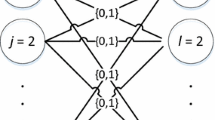Abstract
Addition-subtraction chains (AS-chains) consist of a sequence of integers that allow one to efficiently compute power T E, where T varies but E is constant. The shorter the AS-chain is, the more efficient the computation. Solving the minimisation problem that yields the shortest addition-subtraction is NP-hard. There exists some heuristics that attempt to obtain reduced AS-chains. In this paper, we compute minimal addition- subtraction chains using the ant-colony methodology.
Access this chapter
Tax calculation will be finalised at checkout
Purchases are for personal use only
Preview
Unable to display preview. Download preview PDF.
Similar content being viewed by others
References
Rivest, R., Shamir, A., Adleman, L.: A method for Obtaining Digital Signature and Public-Key Cryptosystems. Communications of the ACM (21), 120–126 (1978)
Dorigo, M., Gambardella, L.M.: Ant Colony: A Cooperative Learning Approach to the Travelling Salesman Problem. IEEE Transaction on Evolutionary Computation 1(1), 53–66 (1997)
Feber, J.: Multi-Agent Systems: an Introduction to Distributed Artificial Intelligence. Addison-Wesley, Reading (1995)
Downing, P., Leong, B., Sthi, R.: Computing Sequences with Addition Chains. SIAM Journal on Computing 3(10), 638–646 (1981)
Nedjah, N., Mourelle, L.M.: Efficient Parallel Modular Exponentiation Algorithm. In: Yakhno, T. (ed.) ADVIS 2002. LNCS, vol. 2457, pp. 405–414. Springer, Heidelberg (2002)
Stutzle, T., Dorigo, M.: ACO Algorithms for the Travelling Salesman Problems. In: Evolutionary Algorithms in Engineering and Computer Science. John Wiley, Chichester (1999)
Nedjah, N., Mourelle, L.M.: Minimal addition-subtraction chains using genetic algorithms. In: Yakhno, T. (ed.) ADVIS 2002. LNCS, vol. 2457, pp. 303–313. Springer, Heidelberg (2002)
Author information
Authors and Affiliations
Editor information
Editors and Affiliations
Rights and permissions
Copyright information
© 2004 Springer-Verlag Berlin Heidelberg
About this paper
Cite this paper
Nedjah, N., de Macedo Mourelle, L. (2004). Minimal Addition-Subtraction Chains with Ant Colony. In: Pal, N.R., Kasabov, N., Mudi, R.K., Pal, S., Parui, S.K. (eds) Neural Information Processing. ICONIP 2004. Lecture Notes in Computer Science, vol 3316. Springer, Berlin, Heidelberg. https://doi.org/10.1007/978-3-540-30499-9_168
Download citation
DOI: https://doi.org/10.1007/978-3-540-30499-9_168
Publisher Name: Springer, Berlin, Heidelberg
Print ISBN: 978-3-540-23931-4
Online ISBN: 978-3-540-30499-9
eBook Packages: Springer Book Archive




